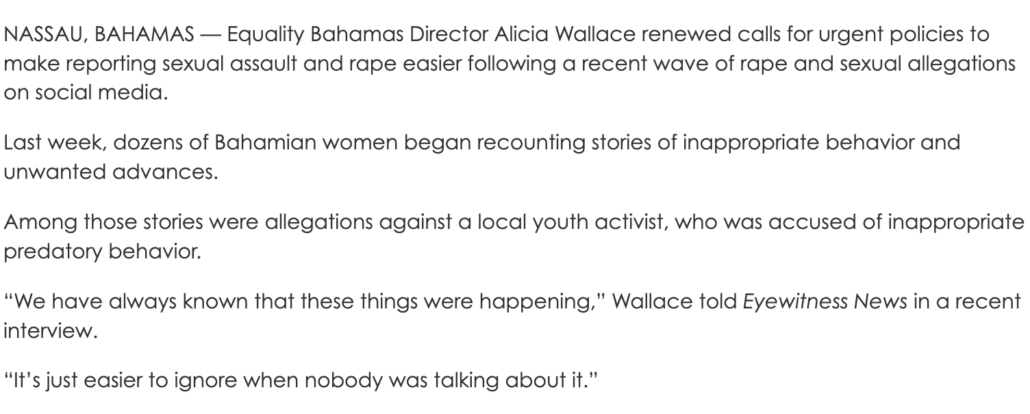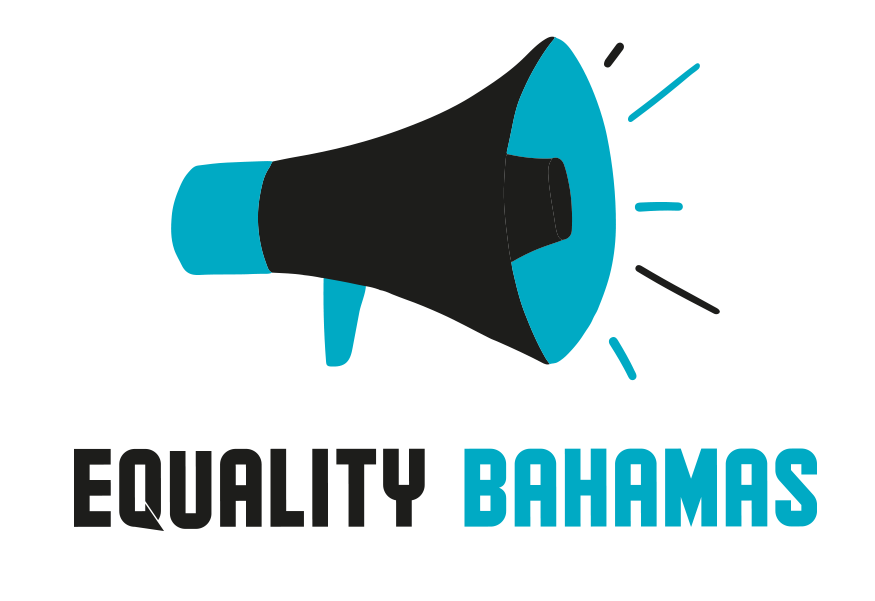Make it easier for victims to report sexual assault, says activist (Eyewitness News)
Jun. 9, 2020 – Eyewitness News
Equality Bahamas founder and co-director Alicia Wallace featured in Eyewitness News on June 9, 2020.
From Eyewitness News:
NASSAU, BAHAMAS — Equality Bahamas Director Alicia Wallace renewed calls for urgent policies to make reporting sexual assault and rape easier following a recent wave of rape and sexual allegations on social media.
Last week, dozens of Bahamian women began recounting stories of inappropriate behavior and unwanted advances.
Among those stories were allegations against a local youth activist, who was accused of inappropriate predatory behavior.
“We have always known that these things were happening,” Wallace told Eyewitness News in a recent interview.
“It’s just easier to ignore when nobody was talking about it.”
[…]
But Wallace insists that the problem lies in the difficultly for victims to report incidents.
“They don’t make it easy,” she said, noting that she was speaking from personal experience.
“It doesn’t seem that the police are getting training specifically on gender-based violence, domestic violence, and sexual violence because of the way people are treated when they go as if they are the perpetrator.
“You have a lot of people who are being silent about what’s happening to them for years and years.”
Wallace contended that social media has given many traumatized victims a way to open up and build community.
She stressed the challenges for women to come forward, given the element of victim-blaming that tends to come into play.
She said she believes that skepticism and disbelief drives other survivors to want to share their stories to know that they have also been through a similar experience,
“It’s been incredibly frustrating and saddening to read all of these stories and to have it confirmed that people are not reporting,” the human rights activist continued.
“For many reasons they are afraid. They don’t want to go through the process. They don’t think that people will believe them or these things are happening to them when they are minors and they don’t know how to tell their parents what is happening to them.”
Wallace noted that The Bahamas has bot been doing a good of protecting its children and must start having age-appropriate conversations about “touching, how to say no, how to say stops, how to talk about what makes them feel comfortable”.
But Wallace acknowledged that the conversation has reached this point of recognition before, pointing to the “Life in Leggings” movement which tackled gender-based violence in the Caribbean.
“It’s really up to us, up to the appropriate government agencies and up to NGOs to make sure the conversation don’t die down and that action is taken,” she said.
“The primary concern is for people who have shared their stories have support.
“We don’t know what they are going to face as a consequence of sharing that story.
“It’s not free. It doesn’t come without a cost. We need to ensure that there are resources in place for their mental health, physical safety, ensure they have safety plans that include social media, ensure they have access to counseling.”
She said reporting must be made easier – even if it can be done anonymously.
“The burden can longer just be on the people who experience these things.”
